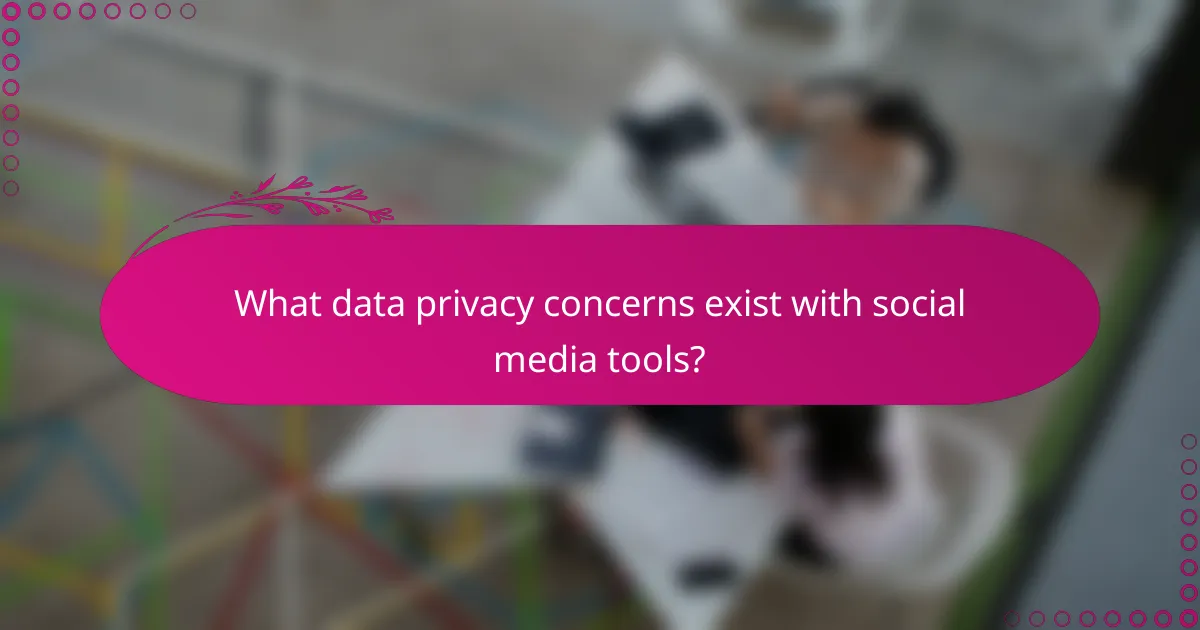In today’s digital landscape, effective social media management tools are essential for brands to safeguard their reputation while navigating challenges such as algorithm changes and data privacy concerns. These tools not only facilitate monitoring and engagement but also help brands adapt to shifting visibility dynamics that can impact audience perceptions. Additionally, addressing data privacy issues is crucial, as users increasingly demand transparency regarding how their information is handled and protected.

What are the best social media management tools for brand reputation?
The best social media management tools for brand reputation help businesses monitor, manage, and enhance their online presence. These tools enable brands to track mentions, engage with audiences, and analyze sentiment, ensuring a positive reputation across various platforms.
Hootsuite
Hootsuite is a comprehensive social media management tool that allows users to schedule posts, monitor brand mentions, and analyze performance across multiple platforms. Its dashboard provides a centralized view, making it easier to respond to customer inquiries and manage brand reputation effectively.
Key features include customizable streams for tracking specific keywords and hashtags, as well as analytics tools that help assess engagement and sentiment. Businesses can utilize Hootsuite’s reporting capabilities to measure the impact of their social media efforts on brand perception.
Sprout Social
Sprout Social focuses on social listening and engagement, making it a strong choice for managing brand reputation. Its tools allow users to monitor conversations about their brand, track sentiment, and identify potential issues before they escalate.
With features like Smart Inbox and detailed reporting, Sprout Social helps brands respond promptly to customer feedback and analyze trends in audience sentiment. This proactive approach can significantly enhance a brand’s reputation over time.
Buffer
Buffer is known for its simplicity and ease of use, making it ideal for small to medium-sized businesses looking to manage their social media presence. It allows users to schedule posts and analyze engagement metrics, which are crucial for maintaining a positive brand reputation.
While Buffer may not offer as many advanced features as some competitors, its straightforward interface and effective scheduling capabilities make it a practical choice for brands aiming to keep their audience engaged and informed. Regularly reviewing analytics can help brands adjust their strategies to better align with audience expectations and improve reputation.

How do algorithm changes impact brand reputation?
Algorithm changes can significantly affect brand reputation by altering how content is displayed and prioritized on social media platforms. These shifts can lead to decreased visibility for certain posts, impacting audience engagement and perceptions of the brand.
Increased visibility challenges
When social media algorithms change, brands may find their content reaching fewer users than before. This can occur if the new algorithm favors different types of content or engagement metrics, making it essential for brands to adapt their strategies accordingly.
To navigate these visibility challenges, brands should regularly analyze their performance metrics and adjust their content strategies to align with current algorithm preferences. Engaging with followers through comments and shares can help maintain visibility despite algorithm shifts.
Content engagement shifts
Changes in algorithms often lead to shifts in how audiences engage with content. For instance, a platform may prioritize video content over static images, requiring brands to rethink their content creation approach to maintain engagement levels.
Brands should experiment with various content formats and monitor engagement rates closely. Utilizing tools to track performance can help identify which types of content resonate best with the audience under the new algorithm, allowing for more informed content strategies moving forward.

What data privacy concerns exist with social media tools?
Data privacy concerns with social media tools primarily revolve around how user information is collected, stored, and shared. Users often worry about unauthorized access to their personal data and the potential misuse of that information by third parties.
User data handling practices
User data handling practices vary widely among social media management tools. Many platforms collect extensive information, including user interactions, preferences, and location data. It’s crucial for businesses to understand these practices to ensure they align with their privacy policies and user expectations.
To mitigate risks, companies should conduct regular audits of their data handling processes. They should also provide clear privacy notices to users, detailing what data is collected and how it will be used. Implementing strong data encryption and access controls can further protect sensitive information.
Compliance with GDPR in Australia
Compliance with the General Data Protection Regulation (GDPR) is essential for any business operating in or engaging with users in Australia. The GDPR mandates strict guidelines on data collection, processing, and user consent, which can significantly impact social media strategies.
Australian businesses must ensure that their social media tools comply with GDPR requirements, such as obtaining explicit consent before collecting personal data and allowing users to access or delete their information. Regular training for staff on data protection practices can help maintain compliance and build trust with users.

How can businesses mitigate brand reputation risks?
Businesses can mitigate brand reputation risks by proactively managing their online presence and responding swiftly to any negative feedback. This involves monitoring social media channels and implementing effective crisis management strategies to address potential issues before they escalate.
Regular monitoring of social mentions
Regularly monitoring social mentions allows businesses to stay informed about public perception and identify potential reputation threats. Tools like Google Alerts, Hootsuite, or Brandwatch can help track mentions across various platforms, enabling timely responses.
Establish a routine for checking social media channels and set up alerts for specific keywords related to your brand. Aim to review mentions at least once a day, especially during high-traffic periods or following major announcements.
Implementing crisis management strategies
Implementing crisis management strategies is essential for minimizing damage during a reputation crisis. Develop a clear plan that outlines roles, communication channels, and response protocols to ensure a coordinated approach when issues arise.
Consider conducting regular training sessions for your team on how to handle negative feedback and public relations crises. A well-prepared team can respond quickly and effectively, reducing the impact on your brand’s reputation.

What criteria should be used to select a social media management tool?
Selecting a social media management tool requires careful consideration of several key criteria to ensure it meets your brand’s needs. Focus on integration capabilities, reporting features, and user interface to enhance efficiency and effectiveness in managing your social media presence.
Integration capabilities
Integration capabilities are crucial when choosing a social media management tool, as they determine how well the tool can connect with other platforms and services. Look for tools that seamlessly integrate with popular social media networks, customer relationship management (CRM) systems, and analytics platforms.
For example, a tool that connects with Facebook, Instagram, and Twitter, while also linking to your email marketing software, can streamline your marketing efforts. Ensure the tool supports APIs or has built-in integrations to facilitate data sharing and workflow automation.
Reporting and analytics features
Robust reporting and analytics features are essential for understanding the performance of your social media campaigns. A good tool should offer customizable reports that provide insights into engagement metrics, audience demographics, and content performance.
Consider tools that allow you to track key performance indicators (KPIs) such as reach, impressions, and conversion rates. Look for features that enable you to compare performance across different platforms and time periods, helping you make data-driven decisions to improve your strategy.

How do social media management tools enhance data privacy?
Social media management tools enhance data privacy by implementing robust security measures and transparent processes that protect user information. These tools help brands manage their online presence while ensuring compliance with data protection regulations.
Secure data storage solutions
Secure data storage solutions are essential for safeguarding user information collected through social media management tools. Many platforms utilize encryption and secure cloud services to protect data from unauthorized access. Look for tools that comply with standards such as GDPR or CCPA, which mandate strict data protection protocols.
Additionally, consider tools that offer regular security audits and updates. This ensures that the platform is equipped to handle emerging threats and vulnerabilities, providing peace of mind for brands concerned about data breaches.
Transparent user consent processes
Transparent user consent processes are crucial for maintaining trust and compliance in social media management. Effective tools clearly outline how user data will be collected, used, and shared, allowing users to make informed decisions. Look for platforms that provide easy-to-understand privacy policies and consent forms.
Moreover, tools that allow users to easily withdraw consent or update their privacy settings demonstrate a commitment to user rights. This not only enhances brand reputation but also helps avoid potential legal issues related to data privacy violations.
